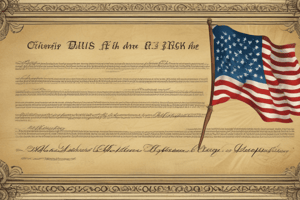Podcast
Questions and Answers
What does the Bill of Rights contain?
What does the Bill of Rights contain?
It contains the First Ten Amendments to the Constitution.
Who were the people that took the lead in making sure that the Bill of Rights was added to the Constitution?
Who were the people that took the lead in making sure that the Bill of Rights was added to the Constitution?
Thomas Jefferson and James Madison.
What are the five basic freedoms in Amendment 1?
What are the five basic freedoms in Amendment 1?
Freedom of Speech, Press, Assembly, Petition, and Religion.
Who said church and state should not mix?
Who said church and state should not mix?
The 6th amendment is?
The 6th amendment is?
What is the 8th Amendment?
What is the 8th Amendment?
What is the second Amendment?
What is the second Amendment?
What is the third amendment?
What is the third amendment?
What is the 4th amendment?
What is the 4th amendment?
What is the fifth Amendment?
What is the fifth Amendment?
What is the 9th amendment?
What is the 9th amendment?
What is the 7th Amendment?
What is the 7th Amendment?
What is amendment 10?
What is amendment 10?
Why shouldn't Government and church mix?
Why shouldn't Government and church mix?
Flashcards are hidden until you start studying
Study Notes
Bill of Rights Overview
- The Bill of Rights consists of the first ten amendments to the U.S. Constitution.
Key Figures
- Thomas Jefferson and James Madison played significant roles in ensuring the Bill of Rights was added to the Constitution.
First Amendment Freedoms
- The First Amendment guarantees five fundamental freedoms:
- Speech
- Press
- Assembly
- Petition
- Religion
Separation of Church and State
- Thomas Jefferson advocated for the separation of church and state to ensure fairness and uphold the First Amendment rights.
Overview of the Amendments
- Sixth Amendment: Guarantees the right to a speedy trial.
- Eighth Amendment: Prohibits cruel and unusual punishments and excessive bail.
- Second Amendment: Confers the right to bear arms.
- Third Amendment: Prohibits the quartering of troops in private homes without consent.
- Fourth Amendment: Protects against unreasonable searches and seizures.
- Fifth Amendment: Establishes the right to due process of law.
- Ninth Amendment: Acknowledges that other rights exist beyond those explicitly listed in the Constitution.
- Seventh Amendment: Ensures the right to a trial by jury in civil cases.
- Tenth Amendment: Asserts that powers not delegated to the federal government are reserved for the states.
Government and Religion
- Mixing government and religion is viewed as unjust as it violates the principle of fairness and contravenes the First Amendment rights.
Studying That Suits You
Use AI to generate personalized quizzes and flashcards to suit your learning preferences.




